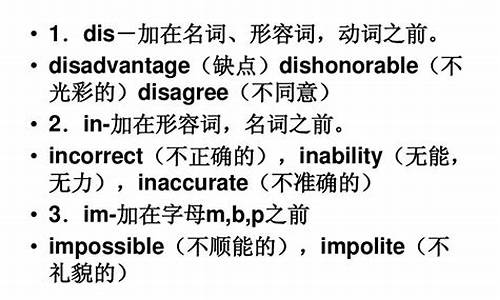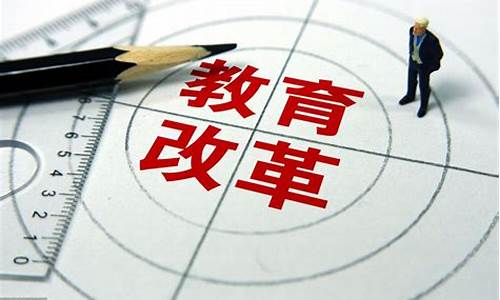您现在的位置是: 首页 > 教育改革 教育改革
高中英语否定前缀,高考否定前缀
tamoadmin 2024-06-01 人已围观
简介1.表否定的前缀(2)a-(an-)2.英文否定前缀有哪些3.否定的前缀和后缀1、in-如incorrect(错误的)、inefficient(低效的)、informal(非正式的)、invisible(不可见的)。注意:infamous(臭名昭著的)并不是famous(著名的)的反义词,且两个词中的a发音不同,infamous为[‘?nf?m?s],而famous为[‘fe?m?s]?。2、im
1.表否定的前缀(2)a-(an-)
2.英文否定前缀有哪些
3.否定的前缀和后缀

1、in-
如incorrect(错误的)、inefficient(低效的)、informal(非正式的)、invisible(不可见的)。
注意:infamous(臭名昭著的)并不是famous(著名的)的反义词,且两个词中的a发音不同,infamous为['?nf?m?s],而famous为['fe?m?s]?。
2、im-
如impossible(不可能的)、immature(不成熟的)、impolite(不礼貌的)、impatient(没耐心的)。
3、il-
如illegal(非法的)、illegible(无法辨认的)、illiterate(不识字的)、illogical(不合逻辑的)。
4、ir-
如irregular(不规则的)、irresistible(无法抵制的)、irresponsible(不负责任的)、irrelevant(不相关的)。
5、ig-
这个前缀比较少见,如ignoble(平民的;卑贱的)。
扩展资料
否定前缀“dis-”。作为否定前缀,“dis-”所表达的含义就是“不…”,
比如:动词 disbelieve 不相信,名词 disbelief 怀疑、disadvantage 不利,还有 disappear 消失,等等。
前缀为“dys-”的词语含有“不正常的,有障碍的”意思,常与描述疾病的词语组合使用。
比如:dysfunctional 不正常的,功能失调的、dyslexia 读写障碍;前缀“a-”的意思是“非、没有、缺乏…”。
它来自希腊语,与这个前缀搭配组成的词语有:atheistic 无神论的、apolitical 无关心政治的;还有一个使用频率高的否定前缀是“de-”。
它源自拉丁语,表示“脱离、离开” — “de-”的具体含义有“逆转、取消”,代表词语有:decline 降低、descend 下降、debug 排除故障,等等。
表否定的前缀(2)a-(an-)
15个否定前缀:表示否定的前缀 1.dis-加在名词、形容词,动词之前。 disadvantage(缺点)dishonorable(不光彩的)disagree(不同意) 2.in-加在形容词,名词之前 incorrect(不正确的),inability(无能,无力),inaccurate(不准确的) 3.im-加在字母m,b,p之前 impossible(不顺能的),impolite(不礼貌的),impudence(厚颜无耻) 4.il-加在以l开头的词前 illegal(非法的),illiterate(文盲的,无文化的)illogical(不合逻辑的) 5.ir-加在以r开头的词前 irregular(不规则的),irresistable(不可抵抗的),irresolvable(不能分解的,不能解决的) 6.un-加在名词,形容词,副词之前 unfinished(未完成的)undoubted(无疑的)unemployment(失业) 7.non-加在形容词,名词前 non-existence(不存在),non-essential(不主要的),non-electrical(非电的) 8.mis-加在动词、名词之前 misunderstand(误解),misjudge(误判),misleading(误导),misfortune(不幸) 9.dis-加地动词之前 10.de-加在名词,形容词之前 11.anti-加在名词、形容词之前 12.counter-加在名词、动词前 13. a-在名词前,表示相反,加强
英文否定前缀有哪些
1 、表否定 a-(an-) ,来源于希腊语,意思是: not 、 without 和 lacking 。
例如:asocial不合群的。
2 、介词性前缀的 a-(an-) ,来源于古英语,意思相当于现代英语中的 on 、 in 。
例如:alive 活的。a- = in 在......中;live=life生命;in life在生存的状态中——活的。)
1 、加在希腊语源的形容词前
eg: ? aperiodic [?e?p?ri?d?k] ?adj.无定期的;非周期性的
an- = not非;periodic 周期性的
(记忆方法:per-每一;od=old时间;ic形容词后缀;一段时间即“周期”)
2 、加在希腊语源的名词前
eg: ?anonym ?[n?n?m ] ?n. 假名;匿名者;化名
an- = without无;onym =name ;
3 、与希腊词根结合,构成原始派生词(较早引入英语的希腊词)
eg: atheism [?e?θi?z?m] ?n. 无神论
a- = without 无;the=god 神(用 Athena雅典娜 来助记 the“神”);-ism= the belife 信仰。
1、an- 用于元音或原先不发音的h 前;
eg: anechoic?[?n?kk]?adj. 无回声的;无反响的
(echo厄科,希腊神话中的森林女神,被赫拉 惩罚,失去正常的说话能力,只能重复别人说的最后几个字,Echo后来意为“回声” 。)
eg:?anharmonic [,?nhɑr'mɑn?k] ?adj. 不和谐的;非调和的
(怎样记harmonic(n.&adj. 和声;和声的?——源自harmony n. 融洽;和声——harm=arm手臂;ony=any多;——手拉手,肩并肩——融洽;和谐。)
2、a- 用于其他情况(辅音、发音的h前等等)。
eg: ?asexual? [?e?sek?u?l] ?adj. 无性的; 无性器官的; 性缺乏的; 性冷淡的
eg: ?ahistorical ?[?e?h?st?r?kl] ? adj. 非历史的; 没有历史背景的; 不顾史实的
否定的前缀和后缀
1.表示否定意义的前缀 1)纯否定前缀 a-, an-, asymmetry(不对称)anhydrous(无水的) dis- dishonest, dislike in-, ig-, il, im, ir, incapable, inability, ignoble, impossible, immoral, illegal, irregular ne-, n-, none, neither, never non-, noesense neg-, neglect un- unable, unemployment 2)表示错误的意义 male-, mal-, malfunction, maladjustment(失调) mis-, mistake, mislead pseudo-, pseudonym(假名), pseudoscience 3)表示反动作的意思 de-, defend, demodulation(解调) dis-, disarm, disconnect un-, unload, uncover 4)表示相反,相互对立意思 anti-, ant- antiknock( 防震), antforeign,(排外的) contra-, contre-, contro-, contradiction, countercurrent (逆流) counter-, counterreaction, counterbalance ob-, oc-, of-, op-, object, oppose, occupy with-, withdraw, withstand
(Prefixes and suffixes)
增添词缀,即前缀或后缀,使原来的词由肯定意义化为否定意义。常用的否定前缀有ab- / dis- / il- / ill- / im- / in- / ir- / mis- / non- / un-等,否定后缀有-less / -free等,例如:
--It is abnormal for him to walk in his sleep. (梦游症)
--This will disqualify (使…没有资格) him from taking part in the game.
--The ship was leaky (漏) and very much disabled.
--Your remark is ill-timed.
--Every word he said was impossible of belief.
--The new evidence has completely invalidated(使…站不住脚)his theory.
--To be afraid of the number 13 is irrational.
--He bore (忍受) his misfortunes bravely.
--On the sea there were fleets of nondescript ships—converted yachts,riverboats,tugs and barges. (在海上有成批的无法归类的船只——改装的游艇、河里的小船、拖船和驳船。)
--Such criticism is meaningless.
--The cause of the accident remains unknown to us.
--Water is incompatible (不相容)with fire.
--She is getting impatient.
--The method of working is useless.
--She is reckless of consequence. (她是不顾后果的。)
--She dislikes being spoken to like this.
--The sea is ice-free.
--He bought two bottles of wine at the duty-free (免税) shop.
上述否定词缀一般都表示否定,但是有时有些否定词缀(前缀,后缀)并不表示否定。例如:
--Thank you for your invaluable (宝贵的) help.
--That nurse was indifferent (冷漠) to the sufferings of the patients.
--Oil is inflammable. (油容易燃烧。)
--Something seems to have unloosed her tongue.(不知什么事情使她说个没完。)
--Styles come and go,but good taste is timeless.(风格随时在变,而风雅是永恒的。)
--He’s a shameless (无耻) liar.
--Works of art,historical monuments and priceless history records were ruthlessly destroyed. (艺术品、历史上遗留下来的纪念品以及珍贵的历史文献惨遭破坏。)
注意:英语中的前缀in-,un-通常表示“不”或“…的相反”的含义,因此由其构成的派生词一般具有否定的意义。然而,有些由这两个前缀构成的派生词并非有否定的意义,而与词根同义或近义。著名学者周海中教授在《in-,un-不一定表示“否定”》一文中就举了若干个例子,如:coming/incoming(来到),habit/inhabit(居住于),loose/unloose(解开,释放),rip/unrip(撕开)等。这类派生词虽然不多,但值得注意,勿望词生义。









